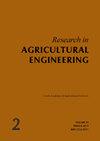水分-对苹果(Blighia sapida)种子摩擦特性的影响
Q3 Agricultural and Biological Sciences
引用次数: 1
摘要
测定了酸苹果(Blighia sapida)种子在11.9、17、22、27和32% (w.b.b)水分条件下的摩擦特性,为设计酸苹果的加工工艺和设备以替代现有的手工加工方法提供了依据。猕猴桃生长在许多西非国家,尤其是尼日利亚。橡胶树种子在尼日利亚奥约州的Lanlate收获,那里主要是橡胶树。采用标准实验方法测定其性能。采用方差分析和P≤0.05的最小显著差异(LSD)对数据进行分析。随着水分的增加,玻璃的静摩擦系数(27.6-36.40)、铝(27.0-30.2)、聚氯乙烯(PVC;在200 g (8.73 ~ 8.93 g·cm-2)、300 g (11.65 ~ 11.79 g·cm-2)和400 g(14.37 ~ 14.65)载荷作用下,表面应力和正应力呈显著线性增加。在200 g (1.62 ~ 1.25 g·cm-2)载荷下,剪切应力呈线性减小,而在300和400 g载荷下,剪切应力变化不显著。内摩擦系数线性减小(0.744 ~ 0.588),说明湿种子比干种子更容易流动,在设计输送机时应考虑到这一点。用回归模型表达了松果种子水分与摩擦性能之间的关系。为设计松果种子的处理工艺和设备提供了数据。本文章由计算机程序翻译,如有差异,请以英文原文为准。
Moisture – Influenced friction properties of ackee apple (Blighia sapida) seeds
The friction properties of ackee apple (Blighia sapida) seeds at an 11.9, 17, 22, 27, and 32% (w.b.) seed moisture were determined, which are vital for designing their processing techniques and equipment to replace the present manual methods. The ackee apple grows in many West African countries, especially Nigeria. The ackee seeds were harvested at Lanlate, Oyo State, Nigeria, where ackee trees are predominant. Standard experimental methods were adopted to determine the properties. The data were analysed using an ANOVA and the least significant difference (LSD) at P ≤ 0.05. As the moisture increased, the static coefficient of friction on glass (27.6–36.40), aluminium (27.0–30.2), polyvinyl chloride (PVC; 27.9–32.8) surfaces and normal stress at 200 g (8.73–8.93 g⋅cm–2), 300 g (11.65–11.79 g⋅cm–2) and 400 g (14.37–14.65) loads increased significantly and linearly. The shear stress linearly decreased at a 200 g load (1.62–1.25 g⋅cm–2), but was non-significant at the 300 and 400 g loads. The coefficient of internal friction linearly decreased (0.744–0.588) implying that the wet seeds flow more easily than the dry ones, which should be considered in designing conveyors. The relationships between the ackee seeds' moisture and friction properties were expressed with regression models. Data for designing the handling techniques and machines for the ackee seeds were obtained.
求助全文
通过发布文献求助,成功后即可免费获取论文全文。
去求助
来源期刊

Research in Agricultural Engineering
Engineering, agriculture-
CiteScore
1.40
自引率
0.00%
发文量
21
审稿时长
24 weeks
期刊介绍:
Original scientific papers, short communications, information, and studies covering all areas of agricultural engineering, agricultural technology, processing of agricultural products, countryside buildings and related problems from ecology, energetics, economy, ergonomy and applied physics and chemistry. Papers are published in English.
 求助内容:
求助内容: 应助结果提醒方式:
应助结果提醒方式:


